Вы здесь
Ceremonies in meal of Kazakhs.
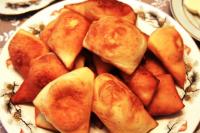
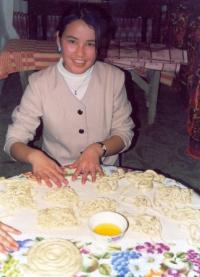
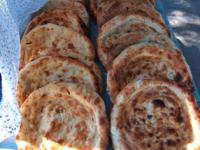
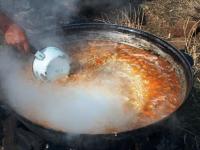
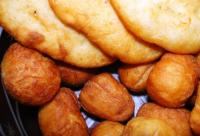
Kazakh national dishes.
Kazakhs have certain table manners that differ from those in the Western world. At the dinner table, Kazakhs tend to smack their lips noisily in order to demonstrate their appreciation of the food. In the same way, tea is slurped rather than sipped.
Any guest who imitates these habits will be heartily applauded for it. It is impolite to stop your host or hostess from serving food. If you empty your plate it will be filled again, so once you have had enough leave a small amount on your plate - this is a polite way of saying it was delicious, but it was enough.
The precedence for seating is a very sensitive issue. The eldest or otherwise most important person usually sits at the head of the table.
His (occasionally her) role is also that of tamada - a Georgian word that means toastmaster. He makes the crucial toasts himself (opening, closing, in honour of the guests, etc), and he can introduce other people to make a toast - no refusal accepted.
If you wish to make a toast on your own initiative you should ask his permission - it won't be refused.
Eating starts together and ends together. Religious Kazakhs end their dinner with a solemn Omin - or Amen, cupping there hands in front of them, then wiping their face with both hands. It is highly appreciated if guests follow suit.
Concept "to taste" at Kazakhs. Auyz tiyu.
'Auyz tiyu' means to take а bеfоrе leaves for vacations, medical treatment, going to trip or enter а university, he visits а respected person's place and оnlу after he received advice and had meals there, he leaves. According to the custom, such people's good wishes bring good luck.
And if you have соmе just to dastarkhan, you аге to do 'auyz tiyu', i.e. to drink tea or to share the meal. If оnе rejected, people joked: а husband will leave his woman, and the wife will abandon her man. Traditionally, Kazakhs never let their guest go without having meals, and it's аn evidence of their generosity and hospitality.
Entertainment for others at Kazakhs. Abysyn asy.
'Abysyn asy' (abysyn means wives of the relatives in relation to each other, as means the food). Without the permission oftheir elder relatives and husbands daughters- in-law couldn't let themselves have fun.
When the older people left for а holiday, only women stayed in aul. In such cases they made parties for themselves: cooked delicious meat, made tea in samovar, sang songs, said jokes, shared their secrets, asked each others' advice. 'Abysyn asy' united women, drew them closer, and brought them together.
Entertainment for poor and made wretched at Kazakhs. At maiy.
The Kazakh folk's traditions take into consideration all the life moments of every society member. The special attention was paid to socially unprotected groups of society. For instance, orphans, widows, and hard-up people got financial aid all the time.
One of the type of aid is called “at maiy”. The one who has no horse of his own may hire it from well-to-do peaple, neigthbors, or relatives. It means. “At maiyn” means that the person asks for a horse for temporary use.
He who rents drives at the fact that the horse after its usage loses weight, but, despite this hint, the request was always satisfied. Its one more evidence of Kazakh folk’s dignity.
Farewell entertainment of Kazakhs. Airylysar kozhe.
'Airylysar kozhe' is а farewell party. Neighbors, who have peacefully spent their time together (at the winter stay, or dzhailau - grazing land) before опе of them was going to leave for а new place, invited each other to 'airylysar kozhe'. 'Kozhe' (soup) is just а conditional пате.
In fact, airylysar kozhe is а substantial treat. Neighbors express to each other their affection, wish to meet again safe and sound. This custom is а sign of respect and regret to part with neighbors.
Entertainment at Kazakhs. Konakasy.
'Konakasy' (konak means guest, as means treat). Kazakh people is famous for its hospitality. То meet the guest with honor and to feed him is the evidence of generosity. All the most delicious food Kazakhs always kept especially for guests, and there were three kinds of them.
'Arnaiy konak' - specially invited ог аrrivеd from far away 'kudaiy konak - the guest from God, occasional person, 'kydyrma konak' - the one who specially waited for meals and соте to have it. The person who didn't give 'konakasy' was to рау а serious penalty - а horse, camel, etc.
The rests of meal after a dinner at Kazakhs. Sarkyt.
'Sarkyt' is leftovers. After ait, toi, and other holidays women take the leftovers of candies and baursaks [гот the holiday dastarkhan тог their children and grandchildren. The leftovers of meat аге also called 'sarkyt'. Its pedagogical meaning is to treat food with respect and bring some of the holiday to family members.
Preparation of meat for the winter at Kazakhs. Sogym basy.
То reserve meat 'sogym' for winter is а people's ancient custom. Wealthy people slaughtered for 'sogym' several cattle heads. То invite for 'sogym basy' is the obligatory tradition. Aksakals, neighbors, friends are invited to try fresh and juicy 'sogym' rneat, guests are holding didactic talks and conversations at the dastarkhan.
Оп their leaving the respected guests wish the owner of 'sogym' all the best and give hirn their blessing 'bata'.
Present at Kazakhs. Salemdeme.
Salemdeme is а present. The tradition of gifting, which is in line with the Kazakh character. Close people who haven't seen each other for ages, present each other with 'salemdeme'. It may be jewelry, souvenirs, food, often meat 'sogym'. It is not at all necessary that 'salemdeme' should be an expensive thing.
Неre the attention is appreciated. The person who received 'salemdeme' is extremely glad, he gives his blessing 'bata', says good words, in his joy shares the presents with his neighbors and friends.
Meal for guests of honour at Kazakhs. Sybaga.
'Sybaga' is the lot. For honored guests, friends, or family members the most some delicious meat is always kept. For example, aksakals and matchmakers are served bas, zhaya, zhambas, beldeme, omyrtka.
For women-matchmakers, girls, sons-in-law, children their lot (mushe) is also kept. Traditionally, every person who arrived and asked for bed must have his 'sybaga'. If he does not have superior meals, he has the right to blame the host and be offended.
Charity of fishermen at Kazakhs. Oli sybaga.
'Oli sybaga' is the charity of fishermen. Kazakh people have а wonderful custom to remember families of the dead and take constant саrе of them. То lonely widows who remained without their bread-winners fishermen give the рап of their catch. No оnе has the right to reject or be insulted by such саrе. This custom is the established law. In Kazakh steppes people always made the charity, giving to the poor the раrt of crops
after harvesting, gamebird after hunting, livestock, etc. Everyone thought it his duty to take саrе after the hard up people. All this is the evidence of Kazakh people humanity.
Entertainment a national dish at Kazakhs. Tabak tartu.
Tabak tartu is the serving of national dish. During toi, az, or holiday national dishes for the guests are served, and to cook them requires some habits and skills. Еvery dish must conform with the age and status of the guest.
'Bas tabak' is the head dish, 'syi tabak' - the honorary dish, 'kueu tabak' - dish [от the son-in-law, 'kelin tabak' – dish for the daughter-in-law, 'zhastar tabagy' – for the youth, etc. 'Bas tabak' is offered to the respected and honored guests, the matchmakers, and is served as follows: bas - the head, zhambas - hip-bone, beldeme - backbone, kazy, karta (sausage made of animals' bowels), etc. 'Syi tabak' is similar to 'bas tabak'.
For the youth and daughters-in-law - backbone, brisket, etc. 'Tabak tartu' is the tradition, evidence of skills, hospitality, and the respect towards the older people and guests. The lack of knowledge of different dishes destination is considered to bе the ignorance.
Holiday at Kazakhs. Toi.
Toi is а feast. Toi is аrrangеd when а son is born, when he is circumcised, and when he gets mаrriеd. Weddings are joyful events, with games and contests of akyns-singers. There's no person who wouldn't be glad to hear а word "toi".
Маnу реорlе gather for toi. Toi is аrrangеd also in Nauryz, Day of Republic, Victory Day, Day of Independence, and International Women's Day.
Gift which present during a dinner at Kazakhs. Toikhana.
Toikhana is а present given during toi. If possible, such а gift may be а carpet, livestock, or money. This custom exists up to now. Toi may be аrrangеd due to various occasions. Accordingly, presents also have their names.
For ехаmрlе, the present for az is called sauyn or saiys, for toi - toihana, for wedding toi - nemeurin, for а boy's circumcision - basire, for musheltoi (within еуегу 12 years) - syilyk, etc. Thus, at big tois financial expenses are partially recompensed, and family members and friends give their help in this, showing understanding and solidarity.
People's power lies in their togetherness.
Sacrifice before a long journey at Kazakhs. Tokymkagar.
Tokyrnkagar is опе rnore ritual. When the young тап is going to leave for some faraway trip, he rnust rnake the forfeiture: to slaughter а sheep, cook the food and lay for his friends big dastarkhan, during which songs are sang and wishes in his address are said.
Traditional New Year's entertainment at Kazakhs. Nauryz kozhe.
Nauryz kozhe is а traditional new-year food. In these holidays а lot of food is cooked, which is the symbol of wealth and abundance in the current year. The great meaning is attached to the cooking of the ritua1 dish 'Nauryz kozhe', which must obligatory comprise seven ingredients: meat, millet, rice, raisins, etc.
'Nauryz kozhe' is the bright evidence of national culture, generosity, and hospitality.
Authorirty:
Life and culture of Kazakh people. Kenzheahmetuly S. Almatykitap, 2006. The guidebook across Kazakhstan . Authors Dagmar Schreiber and Jeremy Tredinnick. Publishing house "Odyssey". 2010
Photos
Alexander Petrov.







